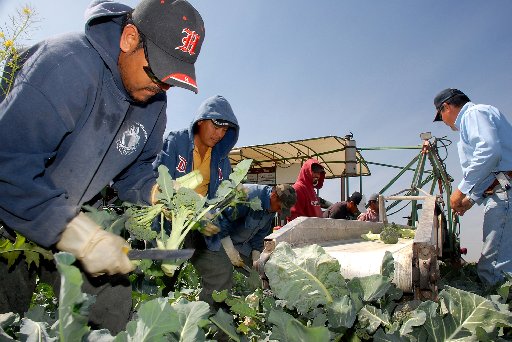Agriculture & Voters Keen on Guest Worker Program

Attempts to tackle comprehensive immigration reform at the state level has wounded agriculture and exposed an unavoidable issue for farm-state lawmakers seeking election in 2012. Because U.S. citizens, by and large, will not work in farm fields and because partisan gridlock over amnesty has kept comprehensive immigration reform off Congress' to-do list, agricultural stakeholders are pleading with lawmakers to reform the country's immigration policy to accommodate an ag-centric guest worker program.
Last year, farm labor shortages gripped states that had passed stringent immigration reforms. Since then the symptoms have spread, as entire regions are feeling the pinch. Industry insiders have voiced concern that its only a matter of time before the promised 'papers please' crackdowns of individuals detained in Arizona, Alabama, and Georgia – coupled with e-verify mandates for employers in those states – translate to higher food prices at the grocery store...but not before the failure of many American farms.
To avoid this scenario, a coalition of 100-plus farm organizations led by the California-based Western Growers farm/trade group are floating an idea to invite foreign guest workers into the U.S. to harvest and process crops without giving them a path to citizenship. Industry leaders hope the plan could operate parallel to the current H2A program in which migrants enter the U.S. for 12 months to work in agriculture before they are supposed to return home. Under the new proposal, immigrant workers could renew their work credentials for another year, but would not be allowed to bring their families into the states.
“I don’t think there is an appetite for comprehensive immigration reform (nationally) so that’s why we’re trying an ag-first proposal,” said Tom Nassif, Western Growers’ President and Chief Financial Officer during a conference call with reporters late last March.
A Tarrance Group-conducted poll (PDF), which surveyed a broad cross section of the American electorate in January, found that 70 percent of voters back such a plan. The survey showed overwhelming support for a streamlined ag-first guest worker program from all likely voter groups including Republicans, Tea Party supporters, Democrats and Independents.
During an Agriculture Department press conference last summer, American Farm Bureau Federation president Bob Stallman called for “new, innovative approaches like programs where biometric identifiers can be provided (to guest workers) … who want to, frankly, do the jobs that American workers will not do.”
Secretary of Agriculture Tom Vilsack reaffirmed Stallman's claim that farmers are hard pressed to find “legal” employees, urging Congress to pass comprehensive immigration reform to prevent farm labor shortages.
“While some American citizens step up and take (farm) jobs, the truth is even when farmers make their best effort to recruit a domestic workforce, few citizens express interest. In large part that’s because this is hard, tough work…“Simply put, our broken immigration system offers little hope for producers trying to do the right thing and make a living. But again and again good faith efforts to fix this broken system – from leaders of both parties – fall prey to the usual Washington political gains.”
Most of Washington's political gains (at least on the right of the spectrum) have hinged on the treatment of immigration reform proposals that include amnesty or “citizenship pathways” as anathemas. The revised guest worker plan pitched by agricultural interests grew up from that volatile soil. It bans any such “pathway” outright.
Nassif made it clear that his group does not want to attach immigration reform language to the next Farm Bill, which has already been jeopardized by budgetary partisanship in the earliest phases of its deliberation. Expect the agricultural industry to pitch its guest worker program to Congress before fall elections.
According to Stallman, between $5 billion and $9 billion per year of production is dependent on workers whose legal status has not been verified and who are assumed to be working illegally. He says that California accounts for almost $3 billion and Florida for $1 billion of that total.
“Most of that is in specialty crops like fruits and vegetables. But the livestock sector, particularly dairy, is also affected,” Stallman said.
In the debate over comprehensive immigration reform its difficult to gain a broad enough perspective not to disqualify one, if not more valid points of view. This owes to the complexity of a political issue which holds livelihoods and the integrity of family units in its balance. But the practical necessity of maintaining a constant and safe food supply while keeping American farms competitive and profitable is an issue of pressing concern for all voters. If farm labor shortages continue through the summer, a refined ag-first guestworker program will likely be a national election issue.




